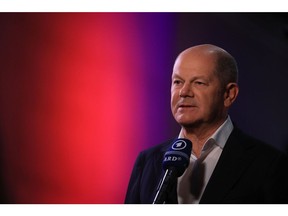Article content
(Bloomberg) — German Chancellor Olaf Scholz amped up on criticism of US President-elect Donald Trump over the integrity of borders during an animated speech meant to motivate Social Democrats ahead of a federal election next month.
German Chancellor Olaf Scholz amped up on criticism of US President-elect Donald Trump over the integrity of borders during an animated speech meant to motivate Social Democrats ahead of a federal election next month.

(Bloomberg) — German Chancellor Olaf Scholz amped up on criticism of US President-elect Donald Trump over the integrity of borders during an animated speech meant to motivate Social Democrats ahead of a federal election next month.
Article content
Article content
Scholz’s main competitors to lead Germany, Friedrich Merz and Alice Weidel, also spoke on Saturday at meetings of their respective parties as campaigning gains steam.
Advertisement 2
Story continues below
Article content
In power since 2021 as the senior member of a now-defunct three-party coalition, support for Scholz’s SPD has slumped as an early election looms for Europe’s largest economy on Feb. 23.
At a party congress in Berlin, the German chancellor spoke of uncertain times ahead in relations with Washington, and also pointed to the rise of the far right in neighboring Austria. Both developments showed that much is at stake for Germany, he said.
“These are times in which people are dreaming of shredding everything to pieces with a chainsaw — democracy, the welfare state, equal rights,” Scholz said. “Times in which certain forces in America are also working very specifically to destroy our democratic institutions in the West.”
The SPD party congress on Saturday formally nominated Scholz as their top candidate and adopted the party’s election program.
Scholz, 66, said Trump’s recent expansionist rhetoric against Greenland and Canada, as well as the Panama Canal, give him cause for concern.
“The principle of inviolability of borders applies to every country,” Scholz said to loud applause. “No country is the backyard of another. No small country should have to fear its big neighbor. That is the core of what we call Western values — our values!”
Article content
Advertisement 3
Story continues below
Article content
His conservative challenger, the CDU’s Merz, said the scolding won’t rattle Trump, and that Germany should rather focus on regaining its own economic and military strength.
“I honestly cannot imagine that the American president is in any way impressed by a four-minute press statement from the German chancellor,” Merz, 69, told reporters after a CDU leadership meeting in Hamburg. “Public finger-wagging from Germany has never made an impression in America, and usually has the opposite effect.”
Merz added that he’s not looking at Trump’s Jan. 20 inauguration “like a rabbit looking at a snake.”
Scholz attacked plans by the conservatives to lower the corporate tax rate, which he said would come at the expense of the working class.
“Who’s going to foot the bill? I’m telling you: The bill will be paid by the ordinary people in this country,” Scholz said. “They will have to accept bitter cuts in public pensions and care.”
Merz defended his party’s proposals, though, by arguing that a revival of economic growth would lead to higher tax revenues, despite lower income tax. A 40% corporate tax in a declining economy will bring less profit than a 25% corporate tax in a growing economy, he said.
Advertisement 4
Story continues below
Article content
The chancellor triggered the early election by firing his finance minister in early November in a dispute over more debt-financed government spending for Ukraine, effectively stripping himself of a majority in the lower house of parliament.
With little more than six weeks until the vote, Merz’s party has a comfortable lead in opinion polls, with the far-right, anti-migration AfD party polling in second place and Scholz’s SPD trailing in third.
The center-right CDU/CSU bloc has about 31% support, according to the latest Bloomberg average of recent surveys, with the AfD at about 20%, the SPD 17% and the Greens 12% in fourth.
A new poll commissioned by the public broadcaster ZDF, though, showed the SPD sliding into fourth place, behind the Greens.
The election campaign took an unexpected turn recently when Elon Musk, the world’s wealthiest person and a key Trump donor and ally, waded in on behalf of the AfD. Musk on the X social media platform he owns disparaged Scholz as an “incompetent fool,” and German President Frank-Walter Steinmeier as an “anti-democratic tyrant.”
Advertisement 5
Story continues below
Article content
Musk spoke at length on Thursday with AfD candidate Weidel on X, in what amounted to free advertising with the potential to reach millions of voters.
Since it was founded in 2013, the AfD has moved progressively toward the extreme right, garnering support among voters disillusioned with mainstream parties, particularly in Germany’s former communist eastern regions.
The AfD officially nominated Weidel as the party’s chancellor candidate at a convention in the Saxony town of Riesa, northwest of Dresden. The meeting started about two hours late amid massive protests against the right-wing party; about 10,000 demonstrators tried to prevent delegates from reaching the venue.
Weidel called in her speech for a complete closure of Germany’s borders and promised to deport people who’d entered illegally. There will be a “clear message to the whole world,” the 45-year-old said. Co-party leader Tino Chrupalla called Weidel “the future chancellor”.
The AfD also calls for a German exit from the European Union and the euro zone, moves which would unwind decades of political and economic integration.
—With assistance from Angela Cullen.
(Updates with AfD co-leader Alice Weidel in second to last paragraph)
Article content
Comments